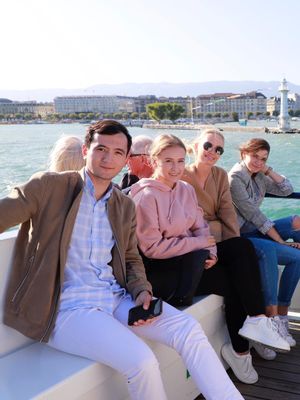IACBE European Regional Conference 2020 in review
On 22 October, the Barcelona Campus team hosted the annual conference for the International Accreditation Council for Business Education (IACBE).
The event was hosted virtually on Zoom with delegates joining us from a variety of timezones from Poland, Turkey, Spain, and Switzerland to the US.
First we received a warm welcome from Director of Geneva Business School, Professor Francis Kahn, where he urged the need for us as a community of educators to find solutions in the challenging new world we find ourselves in. Then we heard from Nicola Jackman, the Campus Director for Spain, who spoke of the issues we now face in the wake of COVID-19, how to deliver, retain and increase quality, how to meet student expectations and the need to establish connectivity with every stakeholder.
During three rounds of speakers we heard from key Geneva Business School faculty and staff, with presentations from successful submissions of proposals. Later in the afternoon President of IACBE, Phyllis Okrepkie gave some updates from the Council. Paul Mallette from Peregrine Global Services then held the final round with a lively discussion centered on Experiential Learning and its relevance in the new normal. Each session was followed with Q & A sessions and/or breakout rooms to deep dive on the topic and share experiences.
The theme for the 2020 conference was:
Future Disruption: A new dawn for higher education?
The conference featured sessions addressing wide-ranging issues with the common threads of Hybrid teaching and learning and the challenges and opportunities of a post COVID-19 world. Here are a few takeaways from the day:
Quality assurance in the hybrid model
Dr. Roy Mouawad
Quality Director, Geneva Business School
As educational institutions shift to a hybrid learning model many administrators and educators are raising questions related to the quality assurance cycle, such as: How do we uphold our teaching and learning standards in a hybrid model? How do we ensure that the learning environment (content and facilities) is fit for purpose? How can we develop a quality culture that is embraced by all? How do we balance equality and fairness in the classroom?
Roy reviewed the outcomes of a qualitative survey he conducted based on the data collected during the Spring of 2020. He presented some informal course evaluations and reviewed the favourite things about the course and things to improve.
The session concluded with three discussion rooms, looking at learning standards, teaching standards and the learning environment. If you would like more information about Roy’s research or his presentation from the conference please get in touch with him directly.
Contact Dr. Roy Mouawad
Using Virtual Worlds in Business Higher Education: A Case from Turkey
Dr. Murat Gulmez
Associate Dean Faculty of Economics and Administrative Sciences, Cag University
Murat delved into the fascinating world of virtual avatars and worlds as a unique teaching experience and opportunity. He looked at the benefits of virtual worlds for carrying out project-based work in teams across multiple timezones. He explored an example of a German non-profit organization who had gathered funds globally online using avatars. He shared the experience of going from a hybrid classroom to wholly online quite seamlessly using these virtual tools. His recommendations were to use the worlds for real, tangible results, they must be rooted in reality to make the outcomes useful to the students. The endless applications for education were explained, from biology to finance to virtual campuses themselves. If you would like to contact Murat, please reach out to him below.
Contact Dr. Murat Gulmez
Faculty and student “buy-in†to the hybrid model: Challenges and best practices
Dr. Oliver Elliott
DBA and Research Program Manager, Geneva Business School
The coronavirus crisis has led educational institutions across the world to shift to a hybrid learning model which combines face-to-face and online learning. For some faculty and students, this new approach has not been popular, with widespread concern that it creates “two-tier†classroom environments and greatly complicates teaching without a commensurate benefit to learning.
Oliver explored the implementation challenges of going hybrid in 2020. He conducted an informal survey of a small sample of students and faculty to discover if hybrid learning online is an adequate replacement for face-to-face teaching. He discovered the need for students to obtain social interaction and networking that is hard to replicate in the online classroom. His recommendations were centered around the need for new rules for the new hybrid classroom, the utility of the flipped classroom and pre-class work to assist in more interactive and practical classes and the cultural shift he feels is necessary to push this forward.
Teaching Diversity and Inclusion
Adil Qureshi
Faculty, Barcelona Campus, Geneva Business School
Adil made the case for teaching cultural intelligence, diversity and inclusion training and teaching for diversity in education. Looking at Hofstede’s Cultural Dimensions model, he talked about the challenges of systemic inequalities during the times of COVID-19. He showed the Google Trends spike in the search term “Diversity and Inclusion†which coincided with the Black Lives Matter movement after the Floyd murder in the US and spoke of the positive side of Generation Z taking diversity into their sphere of consciousness and having a real interest in challenging the status quo. If you would like to learn more about Adil’s research, please contact him.
Contact Adil Qureshi
Teaching Finance after the new dawn
Damien Bezançon
Academic Dean, Geneva Business School
In recent months, the world has gone through unprecedented changes that affected almost every aspect of our lives. In education, we have gone through the disruption of moving online or to a blended format overnight, as well as adapting our pedagogy. This revolution being (almost) complete, we now realize that the very content of what we teach has been disrupted too. In finance, how can we teach the risk-return correlation in times of ‘too big to fail’ and emergency packages? How can we teach statistical tools that ignore extreme events when black swans have been everything we have been subject to in the past 20 years?
Damien explored these contradictions and looked at ways to overcome these difficulties, even how to turn them into opportunities, for finance classes. Under the broad theme of disruption, Damien looked at blob theory and ‘Black swan events’ and how the rapidly changing world is challenging what used to be termed improbable and the repercussions of that on Finance as a subject in the classroom. How to bridge the gap between theory and practice while at the same time being agile and ensuring clear understanding for the students was then discussed in the breakout sessions. Please get in touch with Damien if you have any questions or want to know more about his work.
Contact Damien Bezançon
Experiential Learning
Paul Mallette
Director EMEA Operations, Peregrine Global Services
Our final speaker for the day, Paul Mallette took us through what we actually define as Experiential Learning and it’s many forms. He showed that lectures remain the most used method of instruction and contracted by elaborating on the benefits of ‘learning -by-doing’. He looked at the best skills to develop via experiential learning such as critical thinking, problem solving, teamwork, creativity and adaptability as well as interpersonal skills. He asked the audience how they were incorporating Experiential Learning and then the session broke out into a general discussion to end the day’s presentations in a collective conversation.
Contact Paul Mallette
For any research enquiries please contact Dr. Oliver Elliott
DBA and Research Program Manager, Geneva Business School
For future conference participation or hosting opportunities please contact our Marketing Department






